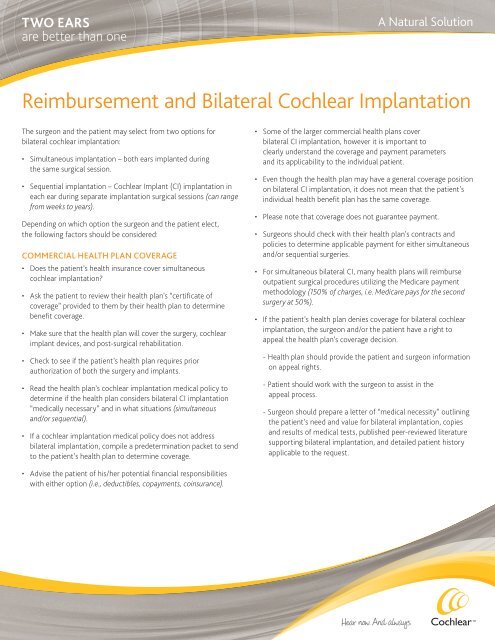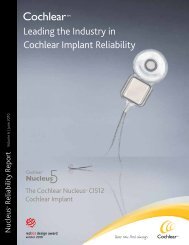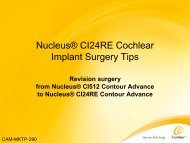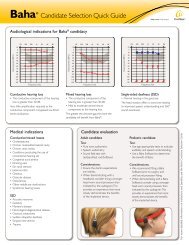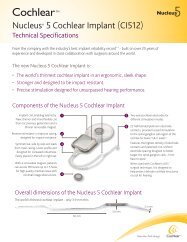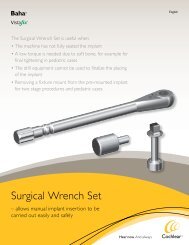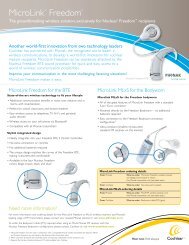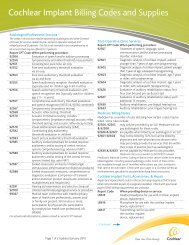Reimbursement And Bilateral - For professionals - Cochlear Americas
Reimbursement And Bilateral - For professionals - Cochlear Americas
Reimbursement And Bilateral - For professionals - Cochlear Americas
You also want an ePaper? Increase the reach of your titles
YUMPU automatically turns print PDFs into web optimized ePapers that Google loves.
TWO EARS<br />
are better than one<br />
The surgeon and the patient may select from two options for<br />
bilateral cochlear implantation:<br />
• Simultaneous implantation – both ears implanted during<br />
the same surgical session.<br />
• Sequential implantation – <strong>Cochlear</strong> Implant (CI) implantation in<br />
each ear during separate implantation surgical sessions (can range<br />
from weeks to years).<br />
Depending on which option the surgeon and the patient elect,<br />
the following factors should be considered:<br />
CommerCial HealtH Plan Coverage<br />
• Does the patient’s health insurance cover simultaneous<br />
cochlear implantation?<br />
• Ask the patient to review their health plan’s “certificate of<br />
coverage” provided to them by their health plan to determine<br />
benefit coverage.<br />
• Make sure that the health plan will cover the surgery, cochlear<br />
implant devices, and post-surgical rehabilitation.<br />
• Check to see if the patient’s health plan requires prior<br />
authorization of both the surgery and implants.<br />
• Read the health plan’s cochlear implantation medical policy to<br />
determine if the health plan considers bilateral CI implantation<br />
“medically necessary” and in what situations (simultaneous<br />
and/or sequential).<br />
• If a cochlear implantation medical policy does not address<br />
bilateral implantation, compile a predetermination packet to send<br />
to the patient’s health plan to determine coverage.<br />
• Advise the patient of his/her potential financial responsibilities<br />
with either option (i.e., deductibles, copayments, coinsurance).<br />
A Natural Solution<br />
<strong>Reimbursement</strong> and <strong>Bilateral</strong> <strong>Cochlear</strong> Implantation<br />
• Some of the larger commercial health plans cover<br />
bilateral CI implantation, however it is important to<br />
clearly understand the coverage and payment parameters<br />
and its applicability to the individual patient.<br />
• Even though the health plan may have a general coverage position<br />
on bilateral CI implantation, it does not mean that the patient’s<br />
individual health benefit plan has the same coverage.<br />
• Please note that coverage does not guarantee payment.<br />
• Surgeons should check with their health plan’s contracts and<br />
policies to determine applicable payment for either simultaneous<br />
and/or sequential surgeries.<br />
• <strong>For</strong> simultaneous bilateral CI, many health plans will reimburse<br />
outpatient surgical procedures utilizing the Medicare payment<br />
methodology (150% of charges, i.e. Medicare pays for the second<br />
surgery at 50%).<br />
• If the patient’s health plan denies coverage for bilateral cochlear<br />
implantation, the surgeon and/or the patient have a right to<br />
appeal the health plan’s coverage decision.<br />
- Health plan should provide the patient and surgeon information<br />
on appeal rights.<br />
- Patient should work with the surgeon to assist in the<br />
appeal process.<br />
- Surgeon should prepare a letter of “medical necessity” outlining<br />
the patient’s need and value for bilateral implantation, copies<br />
and results of medical tests, published peer-reviewed literature<br />
supporting bilateral implantation, and detailed patient history<br />
applicable to the request.
TWO EARS<br />
are better than one<br />
<strong>Reimbursement</strong> and <strong>Bilateral</strong> <strong>Cochlear</strong> Implantation<br />
mediCare<br />
• The current Medicare coverage policy does not clearly<br />
delineate whether bilateral cochlear implantation is covered<br />
for either simultaneous or sequential surgeries. Contact the<br />
Medicare Administrator Contractors (MACs)/Intermediaries/<br />
Carriers to request a medical coverage policy determination<br />
for bilateral coverage.<br />
• Patients who have previously been implanted through their<br />
commercial health plan and are now covered by Medicare<br />
may be covered for the second cochlear implant through<br />
Medicare. However, it is important for the surgeon’s office<br />
check with the applicable Medicare MACs/Intermediaries/<br />
Carriers to request a medical coverage policy determination<br />
prior to providing the service.<br />
• Traditional Medicare does not offer an option for<br />
predetermination or prior authorization of coverage.<br />
Therefore, the only option is to request a<br />
policy interpretation.<br />
• Interpretation may vary by MAC and/or Intermediary/Carrier.<br />
• Medicare reimbursement will vary depending whether<br />
the bilateral implant is simultaneous or sequential.<br />
The information provided in this document is provided as guidelines only to address the unique nature<br />
of implantable hearing solutions technology and is not intended as legal advice. There is no guarantee<br />
that following these guidelines will result in any form of coverage or reimbursement from any insurance<br />
company or federal health care program payer. The information presented herein is subject to change at<br />
any time. This information cannot and does not contemplate all situations that a health care professional<br />
may encounter. To be sure that you have the most current and applicable information available for your<br />
unique circumstances, please consult your own experts and seek your own legal advice regarding your<br />
reimbursement needs and the proper implementation of these guidelines.<br />
www.cochlear.com<br />
<strong>Cochlear</strong> <strong>Americas</strong><br />
13059 East Peakview Ave.<br />
Centennial, CO 80111 USA<br />
Nucleus is a registered trademark of <strong>Cochlear</strong> Limited. <strong>Cochlear</strong> and the elliptical<br />
logo are trademarks of <strong>Cochlear</strong> Limited.<br />
FUN1147 ISS1 JAN10<br />
Tel: 1 303 790 9010<br />
Fax: 1 303 792 9025<br />
Toll Free: 1 800 523 5798<br />
mediCare advantage Plans<br />
• Medicare Advantage Plans must offer the same<br />
benefits defined by traditional Medicare but often<br />
cover additional services.<br />
• Since the traditional Medicare coverage policy<br />
does not clearly delineate whether bilateral cochlear implantation<br />
is covered, it is best to contact the patient’s Medicare Advantage<br />
Plan to inquire about benefit and coverage determinations.<br />
• Medicare Advantage Plans may have policies for predetermination<br />
of benefits, preauthorization requirements, and appeal processes.<br />
Check with the patient’s Medicare Advantage Plan to explore the<br />
options available.<br />
mediCaid<br />
• Coverage for bilateral cochlear implantation is very inconsistent.<br />
• Check with the patient’s state Medicaid plan or Medicaid HMO<br />
to determine coverage and benefits.<br />
• State Medicaid plans and Medicaid HMOs have processes to<br />
appeal claims on an individual basis based on medically necessity.<br />
• Prior authorizations of bilateral implantations are<br />
generally required.<br />
A Natural Solution


